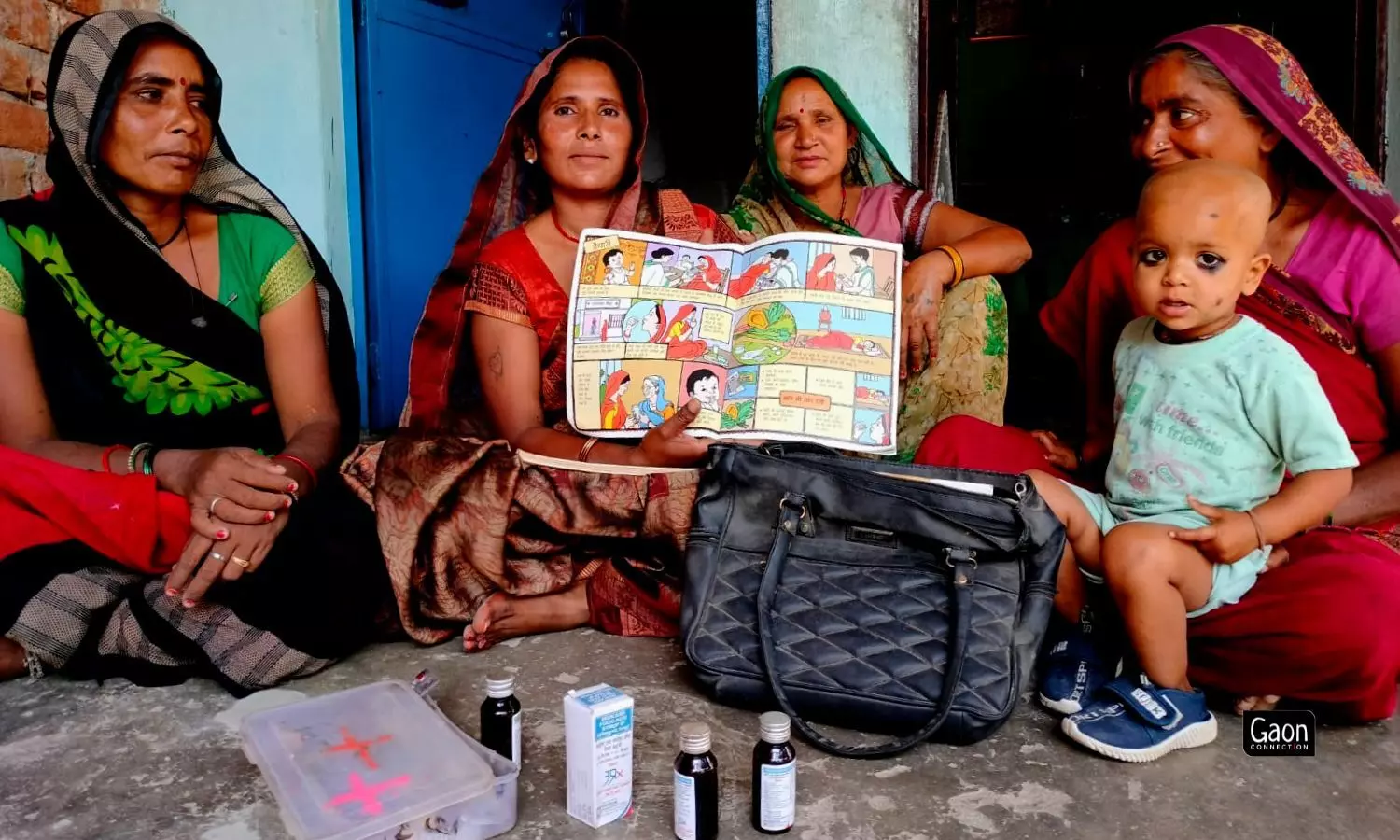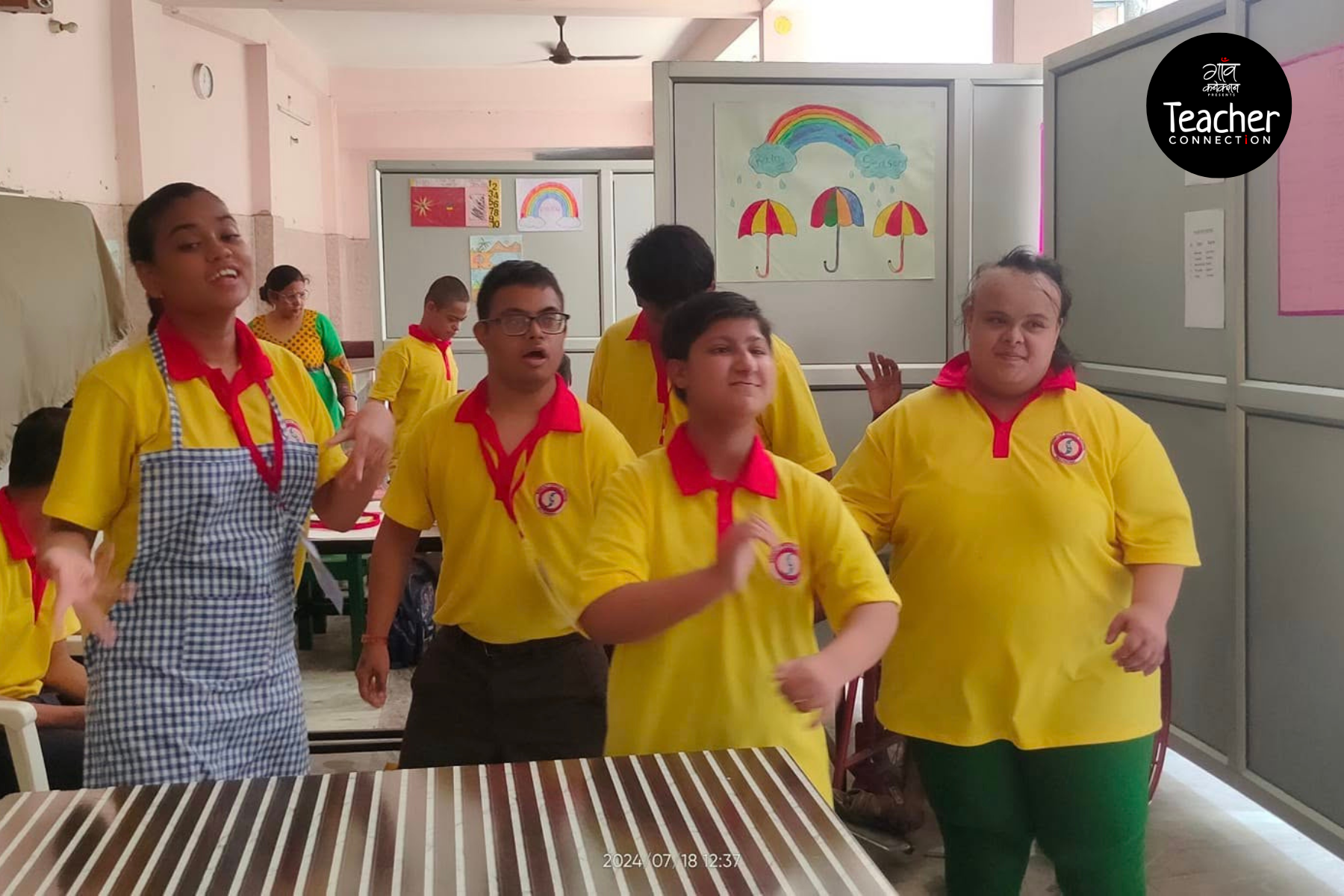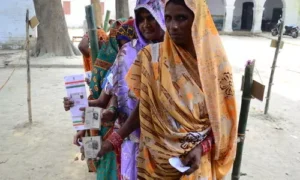Mamna village (Mahoba), Uttar Pradesh
Pyari Devi is never far away from her black rexine bag where she keeps government-issued hard-bound information and education material on maternal health and childcare. Also at hand is a transparent plastic box stocked with condoms, contraceptive pills, and iron tablets that are issued to her by the district hospital.
Pyari Devi is deeply committed to the health of pregnant women in her village Mamna in Mahoba district of Uttar Pradesh, though she is not a government-appointed ASHA (Accredited Social Health Activist) worker.
She is the go to person for the women of the village, and any one seeking help is automatically directed to her two-room mud and brick home in the village.
That day at 6 pm when Gaon Connection met her, the 35-year-old had just returned home, having spent all day with a fellow villager.
“I left home at nine in the morning as Vimala, who is eight months pregnant, complained of stomach pain. I took her to the hospital and only just returned,” she said, quickly adding that she was not an ASHA but has dedicated her life towards the cause of maternal health.

Apart from institutional deliveries, Pyari also guides the village women in matters of contraception and unwanted pregnancies.
“I need to be a high-school graduate to be an ASHA bahu, but I have only studied till class eight. I have spoken to the gram pradhan asking if I can be appointed as an ASHA bahu, but have not heard anything till now,” clarified Pyari Devi.
Also Read: A young woman and her tin box are breaking taboo around periods in rural Mahoba
While fixing the dinner for her four children, a son and three daughters ranging between eight and 19 years of age, Pyari Devi narrated her own traumatic experience with childbirth, which, she said, had motivated her to do something in the space of maternal healthcare.
“I was pregnant in 2011 and my stomach ached but my husband forced me to work in the field. As I lifted a basket of mud with a jerk, I knew instantly something was wrong,” Pyari recalled. She stayed with the pain for three days and even when she had heavy bleeding the following day, she could do nothing about it as there was no one to guide her.
When she reached out to the older women, they told her such things happened sometimes and she shouldn’t worry. But, when the bleeding did not stop, Pyari walked two kilometres to the main road, took an auto and reached the district hospital.
“It was too late. I lost the baby,” she said.
“It was a dreadful time that could easily have been avoided if there was someone in the village who could have guided me,” Pyari said, who had to figure everything out all by herself, even after her miscarriage. “The worst was the mental agony I went through,” she recalled.
A confidante for rural women
Today, Pyari is the confidante she did not have, for women like Vimala. She tries to fill the void she saw when she needed similar help. She advises them on maternal and sexual health, and facilitates institutional delivery for pregnant women.
And, in order to do this she attended a training workshop in Lucknow organised by a private institution, on maternal healthcare in 2012, the year following her miscarriage.

Pyari Devi now ensures that the women in her village understand the importance of folic acid and iron supplements during and after childbirth.
The training was for six months. Five days each month were devoted to training the attendees on the basics of maternal health care. The rest, she picked up at the Mahoba district hospital.
“The health workers at the district hospital guide us on when the vaccinations are to be administered for mothers and children and the need of iron and calcium golis,” Pyari said.
She has been visiting the district hospital for eight years now and has won trust of the healthcare staff.
“Pyari is very good at her work and we have provided her with books and picture guides to help her reach out to the pregnant women and new mothers of Mamna village, and help them get the healthcare support they need, ” Anil Kumari, a basic health worker at the Mahoba district hospital, told Gaon Connection.
Also Read: Championing the cause of mother and child health in rural Rajasthan
Quick action
Through one call, Pyari summons the government ambulance from the district hospital for the expectant mothers of Mamna village.
“Post-deliveries too, I meet the new mothers and listen to everything they go through, their mental battles, their postpartum stories. I don’t judge them, and that is why they trust me,” she said.
“Even the upper caste people reach out to me when the women of their houses need to be taken to hospital for delivery. They know I have experience in this and the process will be easier if I get involved,” explained Pyari, who belongs to the Dalit community.
Apart from institutional deliveries, Pyari also guides the village women in matters of contraception and unwanted pregnancies.
“If any woman in the village wants to abort a child, I advise her not to depend on over-the-counter medicines, rather go to a hospital to get the procedure done. At the end of the day it is the woman who suffers and not the husband who takes these matters lightly,” Pyari told Gaon Connection.
Narrating her own experiences, Pyari said that she was diagnosed anaemic throughout her pregnancy. “But, I didn’t know that I was supposed to take iron supplements or include greens in my diet. My children and I suffered because of ignorance,” she said.
Pyari now ensures that the women in her village understand the importance of folic acid and iron supplements during and after childbirth.

Today, Pyari Devi is the confidante she did not have, for the women in her village in Mahoba, Uttar Pradesh.
The Union health ministry’s National Family Health Survey-5 recorded that in rural Uttar Pradesh only 39.6 per cent of pregnant women had at least four antenatal care visits and a miniscule 8.5 per cent of mothers consumed iron folic acid for 180 days or more during their pregnancy.
According to the World Health Organization, after delivering a child, women need to maintain a balanced diet, just as they did during pregnancy. Iron and folic acid supplementation should also continue for three months after birth.
Also Read: Ensuring safe childbirth among tribal women in Jharkhand
Growing Sisterhood
Over the years, Pyari has created a safe space for young brides and women to discuss matters of physical intimacy and relationships. Nothing is off the table and young women in the village often visit her surreptitiously. They do not just collect contraceptives for themselves and their husbands, but they also have long, sisterhood conversations and plenty of questions.
“They ask me if using condoms will affect their husband’s health, how to convince them to use them, and so on. I also have a lot of young unmarried girls coming to me with matters no one will openly discuss with them. But I do,” Pyari said.
She added that the women trusted her and she on her part did everything to safeguard that trust. For her, educating the women on sexual matters, healthcare and pregnancies is of paramount importance. “What they tell me remains between us,” she said.
“It takes years to build such trust with the community that they reach out to me in such crucial moments of their lives. It isn’t just the money I earn,” smiled Pyari.
Pyari receives a 30 per cent commission from the Mahoba district hospital on the iron and calcium medicines she distributes, and depending on the families of the patients she takes to the hospital, she earns anything between Rs 200 and Rs 500.
This story is part of Gaon Connection’s new series ‘Custodians of Rural Healthcare’ which focuses on stories of frontline healthcare workers in rural India.




















